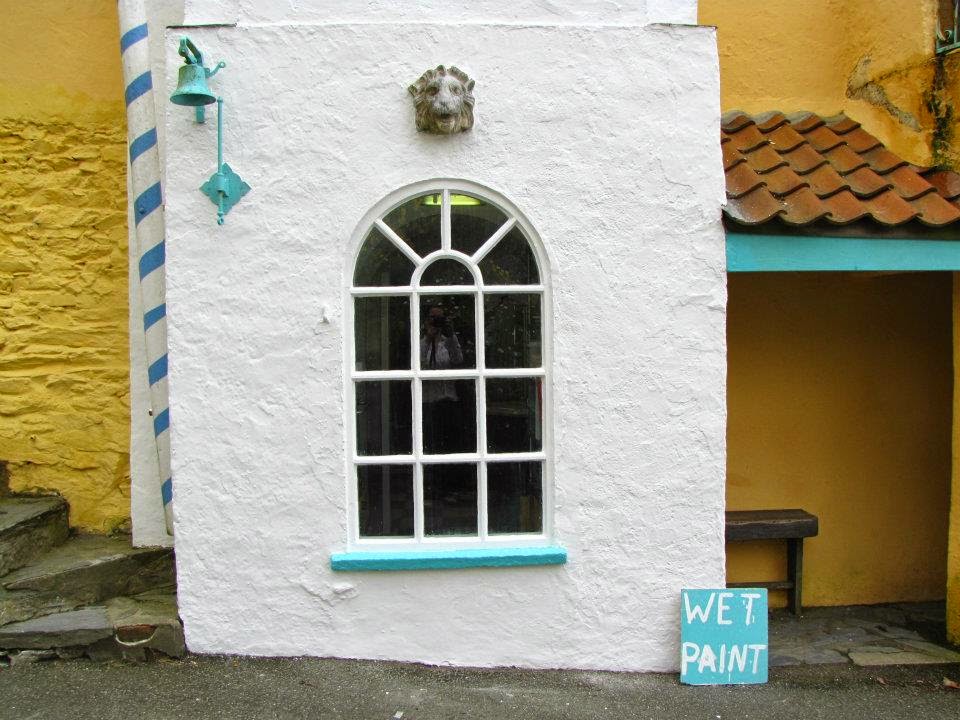Portmeirion was a life project of Bertram Clough Williams-Ellis (1883 - 1978) who acquired the site in 1925 for ljust under £5,000. As he recalled, it was"a neglected wilderness - long abandoned by those romantics who had realised the unique appeal and possibilities of this favoured promontory but who had been carried away by their grandiose landscaping... into sorrowful bankruptcy."
 |
| Bertram Clough Williams-Ellis |
Clough changed the original name Aber Iâ (Glacial Estuary) to Portmeirion: Port because of its coastal location and Meirion as this is Welsh for Merioneth, the county in which it lay. Clough, an architect and landscape designer, created a number of models of his visions for the village in order to attract investors. The concept of a tightly grouped coastal village had already formed in Clough's mind some years before he found the perfect site.
Portmeirion was built in two stages: from 1925 to 1939 the site was 'pegged-out'and its most distinctive buildings were erected; from 1954 to 1976 he filled in the details. Several buildings were salvaged from demolition sites. His last building, the tollgate, was built in his 93rd year. Portmeirion gave Clough pleasure during his life and he hoped that if would give pleasure to others.
Portmeirion is a perfect getaway from everyday life and all stress it brings. Lewis Mumford, a notable architecture critic and writer, described Portmeirion as "an artful and playful little modern village, designed as a whole and all
of a piece ... a fantastic collection of architectural relics and
impish modern fantasies (...) In a
sense, Portmeiron is a gay, deliberately irresponsible reaction against
the dull sterilities of so much that passes as modern architecture
today."
Lovely Italian-style houses painted in bright white, blue or red, are surrounded with flowering bushes and tidy hedges and lawns. Narrow streets lead us through the village and we stopping on every single corner - there is always a lovely detail or two that catches our eyes: painted mural, colourful plaque, or quirky sign above the door.
One of my favourites is Toll House with Saint Peter on a balcony with small canopy above his head. Interesting thing is that the canopy supposed to be bigger but for a mistake at the foundry it turns to be too small. Clough thought St Peter would not mind.
The Bell Tower, or Campanile, has built in 1928. Clough wanted to have a building that will draw the attention to his project. This dramatic tower has a clock that came from a demolished London brewery and for many years the chiming of its bells marked the hour at Portmeirion.
The Piazza was built in 1965 on the place of tennis court that has been there since 1930s. Clough designed fountain pool, Gloriette, Gothic Pavillion and Burmese dancers on Ionic columns that became his masterpieces.
Portmeirion has served as the location for numerous films and television shows, and was "The Village" in the 1960s television show "The Prisoner" (you may remember the scene - big boulder chases British agent, Number Six, on the sandy beach).
Festival N°6 is an annual art and music festival held at Portmeirion, Wales. The festival presents a wide range of music genres, including rock and roll, folk, house, techno and dance. Among a numerous artist performed on Festival are "New Order", "Primal Scream", "Manic Street preachers", "My Bloody Valentine", Tricky, Pet Shop Boys, Beck, Kelis...
Portmeirion village has number of lovely cottages and two hotels (The Portmeirion Hotel and
Castell Deudraeth) to accommodate the visitors. Fifteen self-catering cottages (3 - 8 beds) are available for weekly rent. Cottage kitchens are fully equipped and have crockery, cooking
utensils, glasses and a microwave oven. All cottages have colour
television, direct dial telephone and WiFi internet access.
Heating, towels and linen are included in the price.
Admission prices:
Adults £8.50 (full price £10)
Concession (over 60) £8 (full price £9)
Child (5-15) £5.50 (Full price £6.50)
Family Ticket (2+2) £25 (Full price £30)
Family Ticket (2+3) £30 (Full price £35)
Family Ticket (2+4) £35 (Full price £40)
Hours of opening: 09:30 - 19:30
Shops open 09:30 - 17:00
Cafes open 10.00 - 17:00
Shops open 09:30 - 17:00
Cafes open 10.00 - 17:00







No comments:
Post a Comment